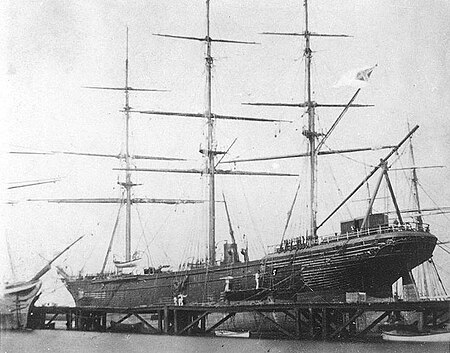We finally surrender
 On November 6, 1865, the Confederacy surrendered. If you’ve heard or read otherwise, allow me to introduce the CSS Shenandoah, a tribute to the military skill and doggedness of the South in a cause unworthy of the devotion it inspired.
On November 6, 1865, the Confederacy surrendered. If you’ve heard or read otherwise, allow me to introduce the CSS Shenandoah, a tribute to the military skill and doggedness of the South in a cause unworthy of the devotion it inspired.
Shenadoah was a commerce raider, initially launched as the Sea King in August 1863, with teak planks on an iron frame and both sail and backup steam power. Originally a cargo vessel, and built in Glasgow, she was converted to a man-o-war in October 1864 after a rendezvous with another ship carrying officers, guns, ammunition etc. (And no, I don’t know why a ship is “she” but a “man”-o-war. That was before pronouns like Xe and everybody getting their own gender.)
Now you may be thinking October 1864 is a bit late to join the U.S. Civil War, which by that point was just a matter of rather bloody mopping up. But Shenandoah went on a tear, striking at Union merchant and whaling ships in the Indian and Pacific oceans. And she captured or sank 37 of them, a majority after the war was formally over.
Of course there was no Internet in those days. And even after her captain, Lieutenant Commander James Waddell, got hold of a months-old San Francisco newspaper reporting the flight of the Confederate government from Richmond, he preferred to believe the statement by Jefferson Davis that the war “would be carried on with re-newed vigor”.
Finally he learned in August that the armies had surrendered and President Davis and much of his cabinet had been captured. So he headed for Liverpool, the unofficial HQ of the Confederate overseas fleet, concerned that if he surrendered to the Union his crew would be hanged as pirates. In the end they weren’t, and when Shenandoah struck her colours the Confederate flag was lowered for the last time.
Five years too late, of course. I have great admiration for many who fought for the Confederacy, and for their attachment to limited government. But the whole thing was about the loathsome institution of racial slavery and all that courage, dash and grit was not merely wasted but entirely misguided.
P.S. If you’re thinking the Confederate flag still flies grotesquely in places like Mississippi, that’s the battle flag not the actual Confederate flag, and the far greater popularity and familiarity of the “Stars and Bars” reflects, I think, the fact that those who fought for the South were by and large far better than their cause.